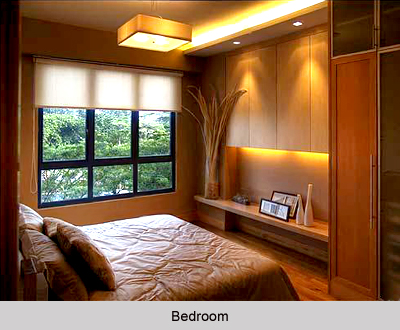 Bedrooms are probably the most precious units in a flat or building. The bedroom is the most personal place in the house where a person relaxes and takes rest. As sleeping is an extremely important factor in healthy living, the positioning, designing and placement of the bedroom is given adequate importance in Vastu Shastra. The various principles according to Vastu should be followed with utmost care in order to attain peace, prosperity and harmony in a person`s life.
Bedrooms are probably the most precious units in a flat or building. The bedroom is the most personal place in the house where a person relaxes and takes rest. As sleeping is an extremely important factor in healthy living, the positioning, designing and placement of the bedroom is given adequate importance in Vastu Shastra. The various principles according to Vastu should be followed with utmost care in order to attain peace, prosperity and harmony in a person`s life.
The following are few of the basic principles that may be used as a guideline while designing a bedroom-
* The first step begins with the selection of the plot. Then the construction of the bedroom should be conducted as per the Vastu principles. In case the plot is large and spacious, the bedroom should be built adjacent to the living room. Bedrooms should generally not be built in the northwest direction of the north side of the plot.
* If the bedrooms are located in the north, then these will receive morning sunrays to some extent.
* If a person sleeps with his head in the east or the south, in north side bedroom, then the person can enjoy a sound sleep.
* If there is a separate bedroom for the head of the family, then it should be in the south-west corner of the west side. If there is more than one floor, the head of the family should have a bed room on the upper storey in the south-west corner of the west direction. Such rooms are also good for adult married offspring. But under no condition it should be a bed room of the younger children. There will be clashes and unnecessary quarrels in the house. A bedroom in the south direction is also acceptable.
* For children, a west side bedroom is the best. An eastern bedroom can also be used for unmarried children or for guests. But these are not suitable at all for newly wed couples.
* If the bedroom is in the south-east direction of the main building, it results in unnecessary quarrels between the husband and the wife. Wasteful expenditure increases and one has to face various problems.
* The north-east is the direction of the deities. Therefore no bedroom should be constructed in this direction. Otherwise, one will face various calamities and diseases.
* The roofs should not be sloping. Moreover the shape of the room should not be pyramidal.
* The colours for the bedroom can be selected from light rose, grey, dark blue, chocolate, dark green and others. White or yellow coloured marble stones should not be used in the bedrooms. White marble is generally used for maintaining the austerity of the temple.
* In the main south-west corner of the south-west side bed room, heavy articles should be kept. The bed in this room should be to the south or the west of the southwest corner of this room.
* Sleeping with legs towards the east gives success and prosperity. Sleeping with legs towards the west brings mental peace and can also instil a penchant for spiritualism; legs toward the north, increases wealth and prosperity. However, sleeping with legs towards the south must be avoided. There will be disturbed sleep, nightmares and negative thoughts in the mind.
* Some buildings do not get proper east-west and north-south directions. They get the corners only. In bedrooms of such buildings, for getting the proper direction, one should not put his or her bed in an oblique position.
* The dressing table in the bed room should be kept in the east of the north direction. Reading and writing work should be done in the west or the east of the bed room.
* Electric appliances, such as, TV, heater or others should be in the south-east corner of the bedrooms.
* The wardrobe should be in the north-west or the south-west walls of the rooms.
* The door of the bed room should be of one shutter, if possible. It can be located in the east, the west or the north. Small windows in the east and the north are also acceptable.
* If bathroom, toilet and changing room are attached to the bed room, they should be in the west or the north sides.
* Avoid keeping safes in the bedrooms. In case they are placed here these should be kept in such a way that does not occupy the south-east, the north-east, the south-west and the northwest corners as well as the east and the north directions. But safes should not be kept towards the north in any room because it opens towards the south, leading to unnecessary expenditure and loss of wealth.
The basic guidelines for designing and positioning of the bedroom, as mentioned by Vastu Shastra, should be properly adhered to, in order to attain happiness and prosperity in the life of a person and his family.




















